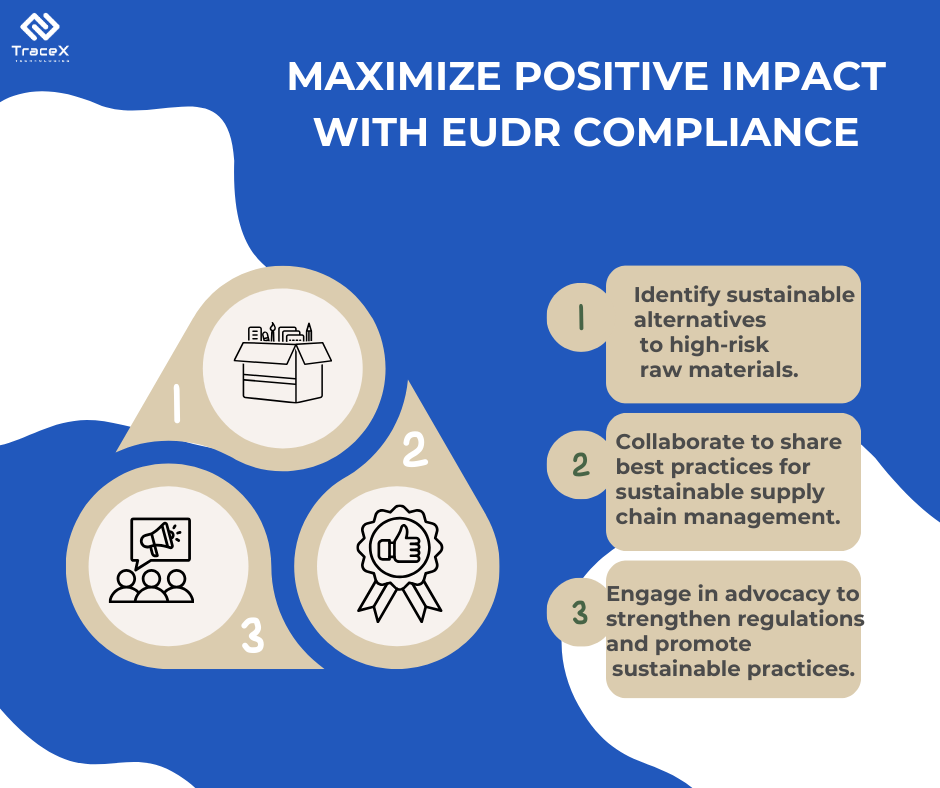Contact: +91 99725 24322 |
Menu
Menu
Quick summary: Explore the significance of EUDR compliance in fostering positive impact within industries. Learn how adherence to EUDR regulations ensures safety, quality, and effectiveness while promoting responsible practices. Dive into our blog for insights.

EUDR deforestation compliance represents a pivotal step towards mitigating deforestation and promoting sustainability within global supply chains. As companies strive to adhere to the European Union’s Deforestation Regulation (EUDR), they not only ensure regulatory conformity but also contribute to positive environmental impact. Embracing EUDR compliance is not merely about meeting legal requirements; it’s about fostering responsible practices that resonate across industries, fostering a greener and more ethical future.
The EUDR comprises several key components and requirements that companies must adhere to. By understanding the scope of this regulation, businesses can ensure they meet the minimum compliance standards. However, it is important to recognize that the EUDR also presents opportunities for companies to exceed these standards and make a more significant impact.
Furthermore, the EUDR has global implications, as it directly influences deforestation practices worldwide. By adhering to the EUDR, companies can contribute to reducing global deforestation rates and promote sustainable practices. This not only benefits the environment but also enhances brand reputation and consumer trust.
Deforestation has far-reaching social and environmental consequences. Deforestation predominantly takes place in tropical regions, with a staggering 95% of occurrences observed there. However, not all deforestation serves local market needs.
Surprisingly, 14% of deforestation results from consumer demand in affluent nations, where imports of beef, vegetable oils, cocoa, coffee, and paper originate from deforested lands.
The UN FAO estimates that 10 million hectares of forest are cut down each year.
By going beyond compliance, companies can address these implications and work towards positive change. They can identify areas for improvement where their actions can have a meaningful impact. For instance, investing in reforestation programs or supporting local communities affected by deforestation can have far-reaching benefits.
Numerous case studies highlight companies that have successfully made a positive impact beyond mere compliance. These examples serve as inspiration and demonstrate the potential for businesses to drive change through sustainable practices and partnerships.
As we step into a new decade of sustainability endeavors, prioritizing no-deforestation supply chains remains paramount. Safeguarding forests, natural ecosystems, and land rights within supply chains not only aligns with responsible business practices but also serves as a crucial pathway to addressing various sustainability goals.
Supply chains significantly contribute to deforestation. To mitigate this impact, companies must integrate sustainability principles into their supply chain management. This involves sourcing materials and products from sustainable suppliers and engaging in responsible production practices.
Unlock the power of transparency and accountability in commodity management.
Discover how traceability solutions can revolutionize your business practices and drive positive impact
By incorporating sustainability into supply chains, companies can reduce their environmental footprint, enhance social welfare, and ensure the long-term viability of their operations. Furthermore, integrating sustainability practices can lead to cost savings and increased operational efficiency.
Numerous companies involved in the production and sourcing of agricultural and forestry commodities have pledged to cease deforestation associated with their supply chains, acknowledging the significant role these sectors play in tropical deforestation. Major brands like Nestlé and Danone committed to eliminating deforestation by 2020, although fulfilling these commitments requires continued efforts. Progress has been observed, with a reduction in deforestation attributed to large-scale oil palm plantations in heavily impacted regions of Indonesia. Moreover, concerted actions by companies and government initiatives have contributed to a decline in primary forest loss across Indonesia.
In reality, prioritizing supply chains that safeguard forests, natural ecosystems, and land rights is frequently the most direct path to addressing various sustainability objectives. This encompasses preserving biodiversity, carbon reserves, and ecosystem services within intact forests, alongside promoting sustainable livelihoods and equitable treatment by upholding human rights in full. An essential aspect of credible net-zero emissions strategies involves prioritizing the reduction of emissions sources. To accomplish this, companies with substantial land holdings must proactively address deforestation and land conversion, which are significant contributors to overall emissions. Persistent destruction of ecosystems, or support thereof through sourcing or financing, poses enduring risks for companies.
Collaborating with stakeholders is vital for creating a positive impact. By engaging with local communities, non-governmental organizations, and governmental bodies, companies can gain a better understanding of the social and environmental challenges they face. This knowledge enables businesses to develop targeted initiatives that address these challenges effectively.
Building partnerships and fostering collaboration is instrumental in driving sustainable change. By working together, companies can leverage collective resources, knowledge, and expertise to tackle complex issues surrounding deforestation. Furthermore, these partnerships enhance transparency and promote ethical practices throughout the supply chain.
Transparency plays a crucial role in promoting positive impact and compliance with the EUDR. By being transparent about their sourcing and production practices, companies can instill consumer confidence and encourage responsible consumption.
Technologies such as blockchain and supply chain management systems can enhance transparency by providing real-time tracking and verification of sustainable practices. These tools enable companies to showcase their commitment to responsible sourcing and contribute to the overall transparency of the industry.
Moreover, accountability mechanisms are necessary to ensure that companies adhere to responsible practices. Certification programs and independent audits can provide assurance that businesses are meeting sustainability standards. By actively participating in these mechanisms, companies demonstrate their commitment to making a positive impact.
By fostering transparency throughout the supply chain, companies can accurately trace the origins of their products, verifying their compliance with EUDR Deforestation standards. This transparency enables stakeholders to access detailed information about sourcing practices, promoting trust and confidence in the integrity of products. Moreover, accountability mechanisms hold companies responsible for adhering to EUDR Deforestation regulations, incentivizing proactive measures to mitigate deforestation risks. Ultimately, transparency and accountability create a positive impact by driving sustainable practices, reducing deforestation, and safeguarding ecosystems for future generations.
The Accountability Framework initiative is integrating the infrastructure developed to uphold no-deforestation goals with the sustainability tools essential for companies’ reliance.
Technology solutions play a crucial role in EUDR Deforestation compliance by providing robust traceability systems that enable companies to track and monitor their supply chains effectively. By leveraging technologies such as blockchain, IoT, and data analytics, companies can ensure transparency and accountability throughout their supply chains, from sourcing raw materials to delivering final products to consumers. These solutions enable companies to verify the origin and sustainability credentials of their products, thereby driving a positive impact by promoting responsible sourcing practices and mitigating the risk of deforestation and other environmental harm. Additionally, technology solutions facilitate data-driven decision-making, enabling companies to identify areas for improvement and optimize their sustainability efforts. Overall, technology solutions are instrumental in helping companies achieve EUDR compliance and contribute to positive environmental and social outcomes.
TraceX traceability solutions offer unparalleled transparency and accountability in supply chain management. By leveraging blockchain technology, TraceX enables seamless tracking of products from source to shelf, ensuring authenticity and sustainability. With real-time data insights and immutable records, TraceX empowers businesses to uphold ethical standards, mitigate risks, and build trust with consumers.
While regulatory compliance is essential, companies should strive to go beyond it. They should view the EUDR as a starting point and actively pursue sustainability initiatives that align with their corporate values and long-term goals.
However, aligning with the EUDR and implementing sustainability goals can pose challenges. Companies must navigate complex supply chains, adapt to evolving regulations, and overcome potential financial constraints. Nonetheless, by leveraging innovative strategies, such as circular economy models and sustainable sourcing practices, businesses can integrate compliance and sustainability efforts effectively.
The future of sustainable supply chain management is promising, with emerging trends that provide opportunities for maximum positive impact. Companies should stay informed about advancements in technology, evolving consumer preferences, and regulatory changes to adapt their strategies accordingly.

EUDR presents an opportunity for companies to make a positive impact beyond mere compliance. By understanding the scope of the regulation, addressing social and environmental implications, integrating sustainability into supply chains, engaging stakeholders, promoting transparency and accountability, and going beyond regulatory compliance, businesses can create a more sustainable future.
Companies that view this regulation not as a burden but as a catalyst for positive change can position themselves as leaders in sustainability, contributing to a world where ecological well-being is integrated into the fabric of corporate success. The journey toward leveraging the EU Deforestation Regulation for positive impact is not just a legal obligation; it is an ethical imperative and a strategic move towards a more sustainable and resilient future.
Together, through industry-wide collaboration and commitment, we can pave the way for a greener and socially responsible world.
